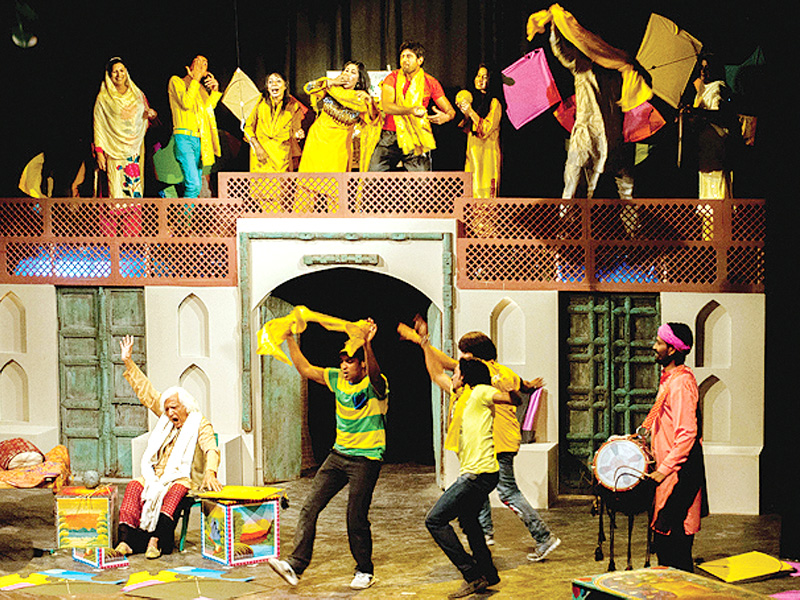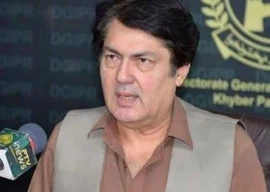
Over the years the country has changed for the worst, most say. But the concept of Ajoka Theatre remains valiant, considering the constraints and growing intolerance. Director Madeeha Gauhar has a sense of intensity and helplessness, it’s been 30 years and all she can do is laugh at the things she has seen and continue dealing with more absurd circumstances.
The 30-year-anniversary festival, titled Aaj Rang Hai, has been derived from Amir Khausrau’s poem. According to the troupe, rang is a word that has inspired poets, painters, lovers and so on and Ajoka has been about bringing colour, despite the dire circumstances.
On Tuesday night, the troupe performed their famed play Dekh Tamasha Chalta Ban - a vicious critique on the societal implications of the blasphemy law. It’s the only time Gauhar didn’t laugh or feel the sarcasm of the environment she is in. She said this play has been dedicated to the late Salman Taseer and this time it is being dedicated to recently-assassinated HRCP member Rashed Rehman.
Ajoka started in 1984, in a house lawn of Cantt, Lahore, as a progressive movement taking place at the time. Its first play was Jaloos, which was written by Indian veteran revolutionary and playwright Badal Sircar.
“When we started the country was under martial law; we did not have access to these halls, the things we wanted to express were in opposition to the dictatorship, with its emphasis on Islamisation, in which minorities and women were the particular targets,” said Gauhar.
“The vision of Ajoka from the beginning was to create a cultural space, which was rapidly shrinking. Considering how Naheed Siddiqui’s programme had been banned and many other symbolic things that happened during Zia’s time, culture and art was facing many restrictions,” she added.

Alternative theatre started from performances in homes and then expanded to small progressive gatherings which primarily compromised of hardened political activists and students. Over the years, Ajoka maintained its overall consistency.
Gauhar’s husband, Shahid Nadeem is a well-known playwright and has seen the political circumstances change. He believes that the staying power of Ajoka stemmed from the fact that it was looking to address questions related to the system, societal mindset and inequality. He explained that they learned to use dry and dark humour and new theatre techniques so that plays maintained interest amongst audiences instead of coming off as a sermon.
“It’s never been easy to write plays on these topics, which are considered bold, as they may provoke people with intolerant and extremist mindsets,” said Nadeem.
He explained that Ajoka’s main idea has been to observe history and contextualise the modern day myths of Pakistan. It represents the disturbing nature of how divided the country is; on one hand there is a modern and aware population which knows its rights and culture and on the other hand, there is a rise in the retrogressive and right-wing movements, which in the past were largely confined to the tribal areas or conservative belts.

“We have worked on accessible plays which have looked at Indo-Pak history, trying to observe the circumstances before partition in an attempt to contextualise history and learn about where these problems are coming from and where they lie,” added Nadeem.
Ajoka Theatre is showcasing seven plays from 10th-17th which include Hotel Mohenjodaro, Kari, Dehkh Tamasha Chalta Ban, Mera Rang De Basanti Chola, Lo Phir Basant Ayee and other classics as well.
Ajoka isn’t the only troupe that has entered its third decade. Back in 2009 Tehrik-e-Niswan celebrated 30 years in a flamboyant ceremony where Sheema Kermani glowed in the spotlight as her students presented light dance and some music at the opening of the Tlism Festival. Tehrik-e-Niswan (The Women’s Movement) is a women’s organisation in Pakistan. It was formed in 1979 in Karachi by Kermani. Tehrik’s initial focus was organising seminars and workshops regarding women issues and now they organise cultural activities like theatre and dance to convey their message.
Published in The Express Tribune, May 15th, 2014.
Like Life & Style on Facebook, follow @ETLifeandStyle on Twitter for the latest in fashion, gossip and entertainment.
1725612926-0/Tribune-Pic-(8)1725612926-0-405x300.webp)





1725254039-0/Untitled-design-(24)1725254039-0-270x192.webp)
1732189200-0/Express-Tribune-(13)1732189200-0-270x192.webp)









COMMENTS
Comments are moderated and generally will be posted if they are on-topic and not abusive.
For more information, please see our Comments FAQ